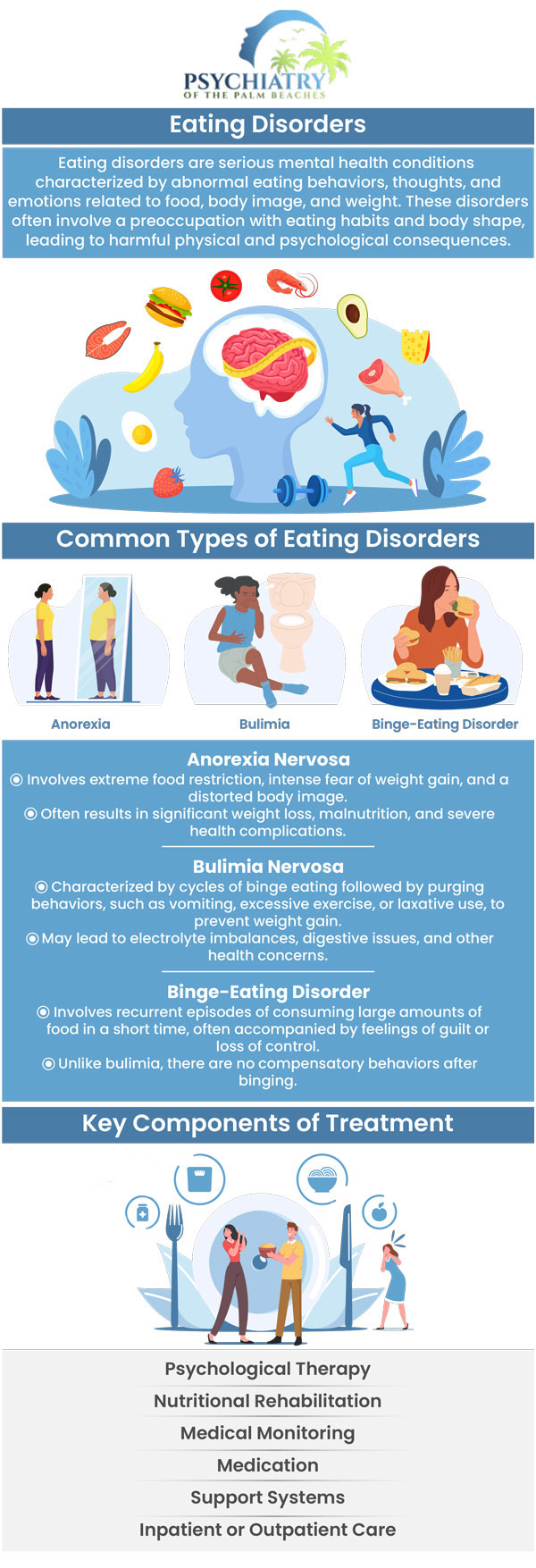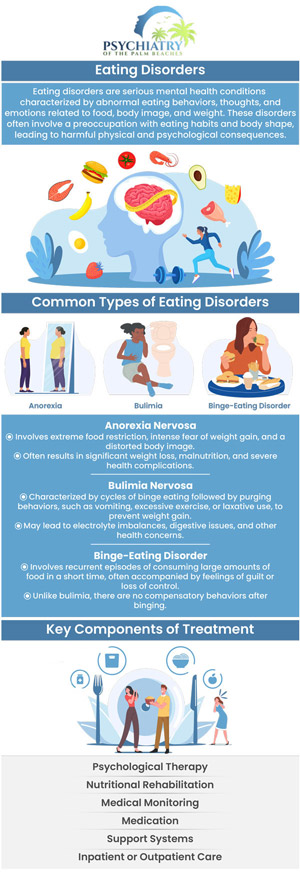Eating Disorder Treatment Specialist in Jupiter, FL
Get specialized eating disorder treatment at Psychiatry of the Palm Beaches with Dr. David Husted. Our compassionate, personalized care helps you regain control and achieve lasting recovery in a supportive environment. For more information, contact us today or book an appointment online. We are conveniently located at 3893 Military Trail Suite 3 Jupiter, FL 33458.


Table of Contents:
What is the first step in treating anorexia or bulimia?
What are the main goals of eating disorder treatment?
How long does recovery from anorexia or bulimia take?
What role does family play in eating disorder treatment?
Eating disorders such as anorexia and bulimia are conditions that are often closely linked to issues with food or body image. However, they often also reflect deep psychological distress and patterns of emotional avoidance, control, or trauma. Individuals may experience distorted self-image, intense fear of gaining weight, or compulsive behaviors around eating and purging. These patterns can affect physical health but also impact individuals in other ways, including harming relationships, mood stability, and decision-making. At Psychiatry of the Palm Beaches, treatment for eating disorders is approached with considerations given to both the medical and emotional sides of recovery.
The first step in the treatment of anorexia or bulimia is to stabilize the individual’s physical and emotional state. That involves assessing whether the patient is medically safe and whether their daily habits are sustainable. This process can include evaluating vital signs, current eating behaviors, and any co-occurring mental health symptoms such as anxiety, depression, or obsessive thinking. While treatments vary according to patient presentation, the early focus is often on reducing immediate risks while also laying a foundation for further treatment.
Once stability is addressed, the individual can begin to build a treatment plan that includes both nutritional rehabilitation and therapeutic work. Some individuals find themselves hesitant to begin this process; however, that hesitation is expected and met without judgment. The first phase of care is about creating safety so that the patient can begin to engage without fear of being misunderstood or pushed too quickly to make necessary behavioral changes.
At Psychiatry of the Palm Beaches, providers work closely with each individual to identify where they are in terms of readiness and what kind of structure will support them best. For some, that may include weekly therapy sessions and nutritional counseling. For others, a more intensive approach may be needed.
The goals in treating anorexia or bulimia include weight restoration and stopping purging behaviors. However, the larger work lies in helping the individual understand why those behaviors developed and how to respond to emotional stress in new ways. Treatment aims to support psychological flexibility, emotional regulation, and a more stable relationship with food and the body. This can take time and usually involves a mix of individual therapy, medical monitoring, and nutritional support.
Another treatment goal is to reduce the mental preoccupation with food, weight, and body image. In many cases, these thoughts take up most of the individual’s attention, making it hard to focus on relationships, school, or work. Therapy helps shift that attention by helping the patient learn how to recognize these patterns and challenge them. Over time, treatment plans will be tailored according to patient needs and response, to help the individual reestablish trust in their own body, reduce the grip of compulsive behaviors, and improve quality of life.
Timelines for recovery from eating disorders vary, especially when an eating disorder has been part of the person’s life for years. Some individuals begin to notice shifts in a matter of months. For others, the process can stretch over years with varying levels of intensity. It often depends on the severity of the symptoms, the presence of any other mental health conditions, and how deeply ingrained the disordered behaviors have become.
The early stages of recovery focus on physical health and daily stability. Once the individual is no longer operating in crisis, deeper work begins. That can include exploring trauma, learning how to tolerate distress without using food or purging, and developing a more stable sense of self-worth. At Psychiatry of the Palm Beaches, recovery is measured by shifts in mindset, changes in behavior, and the individual’s ability to live more fully outside the boundaries of the disorder once created. Providers continue to adapt care as the patient’s needs evolve, focusing less on timelines and more on sustained, realistic progress.
Family involvement can be beneficial for some patients in eating disorder treatment, especially when the individual is young or still living at home. In many cases, family members are the ones who first recognize the signs that something is wrong. When treatment begins, their support can make a significant difference in how the patient engages with care. In some cases, family therapy is used to work through patterns that may be contributing to the disorder or making recovery more difficult. This can include unspoken expectations, communication difficulties, or unresolved emotional dynamics. When these things are addressed openly, the family becomes less reactive and more supportive. That shift can reduce shame and help the patient feel less isolated in the recovery process.
Restorative Eating Disorder Treatment by Dr. David Husted
Psychiatry of the Palm Beaches offers restorative care designed to rebuild both physical and emotional health. Dr. David Husted helps patients understand the emotional triggers behind their eating patterns and teaches strategies that promote self-acceptance and healing. This supportive approach encourages steady, meaningful progress.
Eating disorder treatment is available at Psychiatry of the Palm Beaches. For more information, contact us today or book an appointment online. We are conveniently located at 3893 Military Trail Suite 3 Jupiter, FL 33458. We serve patients from Jupiter FL, North Palm Beach FL, Riviera Beach FL, West Palm Beach FL, and surrounding areas.
Check Out Our 5 Star Reviews



Additional Services You May Need
▸ Mental Wellness
▸ Relationship Coaching
▸ Depression and Mood Disorders
▸ Women’s Health
▸ Panic Disorder
▸ Medications Management
▸ Men’s Health
▸ Individual Psychotherapy
▸ Bipolar
▸ ADHD
▸ Geriatric Mental Health
▸ Couple’s Counseling
▸ Obsessive Compulsive Disorder
▸ Social Phobia Treatment
▸ Eating Disorders
▸ Post Traumatic Stress Disorder
▸ Psychotic Disorders


